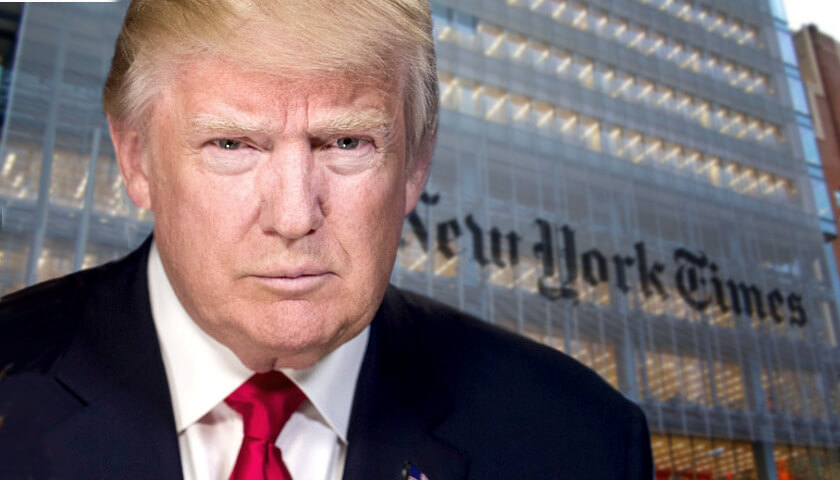The Trump campaign announced Wednesday it filed a lawsuit claiming The New York Times knowingly libeled the president when the paper reported as fact a conspiracy to “collude” with Russia.
Jenna Ellis, Senior Legal Adviser to the re-election campaign, Donald J. Trump for President, Inc., said in a statement:
Today the President’s re-election campaign filed suit against the New York Times for falsely stating the campaign had an ‘overarching deal’ with ‘Vladimir Putin’s oligarchy’ to ‘help the campaign against Hillary Clinton’ in exchange for ‘a new pro-Russian foreign policy, starting with relief from … economic sanctions.’ The statements were and are 100 percent false and defamatory. The complaint alleges The Times was aware of the falsity at the time it published them, but did so for the intentional purpose of hurting the campaign, while misleading its own readers in the process.
The lawsuit says the purpose of the court action is to “publicly establish the truth, properly inform The Times’ readers (and the rest of the world) of the true facts, and seek appropriate remedies for the harm caused by The Times’ intentional false reporting.”
The move stems from an opinion article that ran at the end of March, 2019 titled “The Real Trump-Russia Quid Pro Quo” by the former Executive Editor of the Times, Max Frankel. A first-generation German whose family fled Nazi Germany, Frankel was awarded the Pulitzer Prize in 1973 for his coverage of President Nixon’s historic trip to re-establish diplomatic relations with China.
Frankel’s “Quid Pro Quo” article reads, in part:
Collusion — or a lack of it — turns out to have been the rhetorical trap that ensnared President Trump’s pursuers. There was no need for detailed electoral collusion between the Trump campaign and Vladimir Putin’s oligarchy because they had an overarching deal: the quid of help in the campaign against Hillary Clinton for the quo of a new pro-Russian foreign policy, starting with relief from the Obama administration’s burdensome economic sanctions. The Trumpites knew about the quid and held out the prospect of the quo.
Run down the known facts about the communications between Russians and the Trump campaign and their deal reveals itself. Perhaps, somewhere along the line, Russians also reminded the Trump family of their helpful cooperation with his past financial ventures. Perhaps, also, they articulated their resentment of Mrs. Clinton for her challenge as secretary of state to the legitimacy of Mr. Putin’s own election. But no such speculation is needed to perceive the obvious bargain reached during the campaign of 2016.
Early on, emissaries of the Russian oligarchs sent word of their readiness to help embarrass and undermine the Clinton candidacy. And in June 2016, the Russians lured the Trumpites to a meeting in Trump Tower with a promise of “dirt” against Mrs. Clinton only to use the meeting to harp on their hunger for sanctions relief. As the Trump family openly acknowledged, the Russians spoke at that meeting of a desire to again allow Americans to adopt Russian children. Since the adoptions were halted to retaliate against the American sanctions, it required no dictionary to interpret the oligarchs’ meaning: “dirt” for sanctions relief.
The lawsuit is asking the court to award the Campaign compensatory damages in the millions, punitive damages according to proof, costs to cover the legal action.
Read the full filing:





